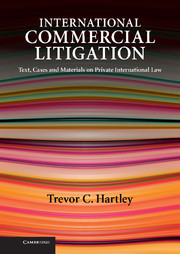Book contents
- Frontmatter
- Contents
- Table of panels
- List of figures
- Preface
- Acknowledgments
- Terminology
- Table of Latin phrases
- List of abbreviations
- Table of cases
- Table of cases (European Court of Justice, numerical order)
- Table of legislative instruments
- PART I STARTING OFF
- PART II JURISDICTION
- PART III FOREIGN JUDGMENTS
- PART IV PROCEDURE
- PART V CHOICE OF LAW
- 22 Introduction to choice of law
- 23 Torts
- 24 Contracts: the principle of party autonomy
- 25 Contracts: legal policy and choice of law
- 26 Contracts: regulating business, protecting employees and helping consumers
- 27 Foreign currency
- 28 Property: tangible movables
- 29 Contractual rights and property interests – I
- 30 Contractual rights and property interests – II
- 31 Contractual rights and property interests – III
- PART VI EXTRATERRITORIALITY
- Bibliography
- Index
28 - Property: tangible movables
from PART V - CHOICE OF LAW
- Frontmatter
- Contents
- Table of panels
- List of figures
- Preface
- Acknowledgments
- Terminology
- Table of Latin phrases
- List of abbreviations
- Table of cases
- Table of cases (European Court of Justice, numerical order)
- Table of legislative instruments
- PART I STARTING OFF
- PART II JURISDICTION
- PART III FOREIGN JUDGMENTS
- PART IV PROCEDURE
- PART V CHOICE OF LAW
- 22 Introduction to choice of law
- 23 Torts
- 24 Contracts: the principle of party autonomy
- 25 Contracts: legal policy and choice of law
- 26 Contracts: regulating business, protecting employees and helping consumers
- 27 Foreign currency
- 28 Property: tangible movables
- 29 Contractual rights and property interests – I
- 30 Contractual rights and property interests – II
- 31 Contractual rights and property interests – III
- PART VI EXTRATERRITORIALITY
- Bibliography
- Index
Summary
Introduction
Our next theme is property. We saw in Chapter 22, § 2.3.3, above, that the view is widely held that property matters are governed by the lex situs, the law of the country where the property is situated. However, it was suggested that, while this works well in the case of tangible property, it is unsatisfactory when applied to intangible rights, such as contractual debts, bank accounts, shares, bonds, certificates of deposit, letters of credit and other financial instruments. We will therefore separate these two kinds of property: this chapter will deal with tangible property and the next with intangible rights.
Tangible property may be either movable (goods) or immovable (land). The application of the lex situs to land is so obvious that almost nothing needs to be said about it: all property rights (rights in rem) in land are governed by the law of the country in which the land is located. Many countries, including England, also apply this rule to succession. The result is that the deceased's property may be split up into a number of different estates. If, for example, he dies domiciled in England, leaving a flat in France and a villa in Spain, he will be treated by an English court as having three estates: his movable property, wherever situated, would constitute one estate, governed by English law (the law of his domicile); the French immovables would be a second estate, governed by French law (the lex situs); and the Spanish immovables would constitute a third estate, governed by Spanish law (also as the lex situs).
- Type
- Chapter
- Information
- International Commercial LitigationText, Cases and Materials on Private International Law, pp. 696 - 719Publisher: Cambridge University PressPrint publication year: 2009



